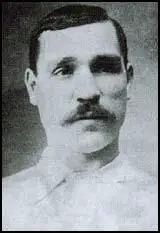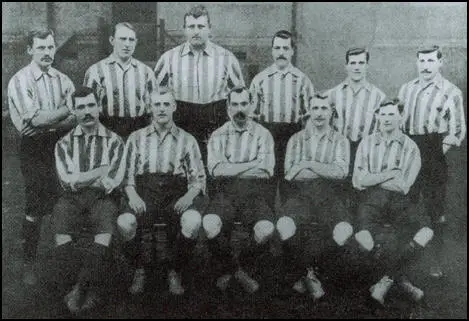Walter Bennett

Walter Bennett was born in Mexborough in 1874. After leaving school he worked as a coalminer. An outside right, Bennett played football for Mexborough Town before being sold to Sheffield United in 1895 for £10.
In the 1896-97 season Sheffield United were runners-up behind the double-winning Aston Villa. The team conceded just 29 goals throughout the campaign and the club had easily the best defensive record in the Football League.
Sheffield United won the First Division championship of the Football League in the 1897-1898 season. The team included players such as William Foulke, Ernest Needham and George Hedley.
The club struggled the following year in the league but the team did reach the final of the 1899 FA Cup. Joan Boag scored for Derby County in the first-half. Sheffield United equalised when Bennett headed home an Ernest Needham cross. The club added three more goals and won the final 4-1.
With William Foulke in goal and Ernest Needham organizing the back five, Sheffield United was a very difficult team to play against and in the 1899-1900 season they once again had the best defensive record in the league and finished in second place to Aston Villa.
On 18th March, 1901, Bennett won his first international cap. England beat Wales 6-0. He also played in the 2-2 draw with Scotland twelve days later. The English team included Ernest Needham, Steve Bloomer and Fred Blackburn. He failed to score in both games and was not selected again.
The following season Bennett was a member of the Sheffield United team that reached the 1901 FA Cup Final against Tottenham Hotspur. Bennett and the other players were on a £10 win bonus. However, the Southern League side was on a promise of £25 a man if they won the cup. The game ended in a 2-2 draw. Spurs won the replay 3-1.
Bennett was a member of the Sheffield United team that played Southampton in the 1902 FA Cup Final. Sheffield took an early lead but Southampton scored a controversial equalizer and the game was drawn. C. B. Fry wrote in the Southern Echo: "The outstanding feature of the match was the grand goalkeeping of Foulke. he made a number of good saves, and on two or three occasions cleared the ball from what appeared impossible positions. Once, near the end, from a corner, he effected an absolute miracle with four or five men right on to him."
William Foulke was furious that the equalizing goal had been given after the game he went searching for the referee. The linesman, J. T. Howcroft, described how Frederick Wall, secretary of the Football Association, tried to placate the goalkeeper: "Foulke was exasperated by the goal and claimed it was in his birthday suit outside the dressing room, and I saw F. J. Wall, secretary of the FA, pleading with him to rejoin his colleagues. But Bill was out for blood, and I shouted to Mr. Kirkham to lock his cubicle door. He didn't need telling twice. But what a sight! The thing I'll never forget is Foulke, so tremendous in size, striding along the corridor, without a stitch of clothing."

Walter Bennett was injured and could not take part in the replay. He was replaced by William Barnes on the wing. The game was only two minutes old when a massive clearing kick by Foulke reached George Hedley and Sheffield United took an early lead. Led by the outstanding Ernest Needham, Sheffield dominated play but Albert Brown managed to score a equalizer. Southampton began to apply pressure but according to the Athletic News, "Foulke was invincible". With ten minutes to go, Needham took a shot that the Southampton goalkeeper, John Robinson, could only block, and Barnes was able to hit the ball into the unguarded net. Sheffield won 2-1 and Foulke had won another medal.
Sheffield United finished in 4th place in the 1902-03 season. The following year he moved to Bristol City in the Second Division. In his nine years at the club he scored 64 goals in 195 games. In the 1905-06 season he helped Bristol gain promotion to the First Division.
Bennett retired from professional football in 1906. He retumed to work at the Denaby Main Colliery but continued to play for Mexborough Town on Saturday afternoon.
Walter Bennett died on 6th April, 1908, when the roof of the Denaby Main Colliery collapsed. He was thirty-three years old.
